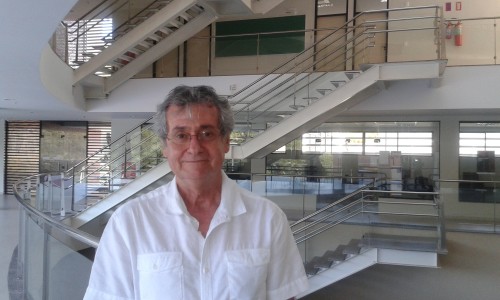By Matin Durrani in Natal, Brazil
I took a break yesterday afternoon from the 50th anniversary meeting of the Brazil Physics Society here in Natal in the north-east of the country to visit the International Institute of Physics (IIP). Located on the campus of the Universidad Federal do Rio Grande do Norte, the IIP was founded in 2010 to carry out cutting-edge research in theoretical physics and help push forward Brazilian science on the international stage. If you’re a theorist, it’s hard to imagine a more pleasant environment for doing physics.
Previously housed in a small, cramped building (albeit with a swimming pool), the IIP moved into a shiny, new three-storey building in March this year. One striking architectural feature is the institute’s central atrium, which is fully open to the outside world. Natal has such a great climate – it’s 25–30 °C all year round and almost always sunny – that there’s no need for stuffy walls and doors. The design also lets the regular, strong breezes that blow into Natal from the Atlantic to add a delightful, cooling touch.
I’d been invited to the IIP by its director Alvaro Ferraz, who discussed the institute’s aims, gave me a tour of the building and introduced me to its four permanent professorial staff. As we stood on the main concourse, Alvaro pointed out the institute’s seminar rooms, discussion areas and library.
He also explained how a garden with local, tropical plants is to be installed at the bottom of the atrium, complete with a bright red “flamboyant” tree. And apparently the Nobel-prize-winning theorist David Gross, who’s on the IIP’s advisory council, suggested that the seats in the main lecture room be arranged in an arc, not straight lines, so everyone can see each other.
A key feature of the IIP is its international outlook, with 25 of its 30 staff being visitors from Brazil and elsewhere in the world, housed in sunlit offices overlooking the atrium. The IIP currently focuses on quantum information, quantum optics, condensed-matter theory (notably strongly correlated electron systems) and field theory, with a new staff member beginning an effort in gravitational waves later this year.
It’s fair to say that the IIP is far from Brazil’s main scientific centres in São Paulo and Rio de Janeiro in the south of the country, but there are certain benefits to being in Natal, Ferraz explained. Partly it’s political and financial: the IIP has had strong support from the local university and backing from the Brazilian government.
The institute has also a clear vision and purpose, with a focus on running workshops and conferences, having a strong visitor programme, and – perhaps most important of all – hiring theorists who are receptive to new ideas beyond their own discipline.
“We want physicists who can interact with people beyond their own fields,” says Ferraz. “We want them to develop new ideas, broaden their perspectives and not be too specialized.”
But Natal boasts other, practical advantages too. The beaches are beautiful – I’ve taken a couple of early-morning dips myself – and the strong winds mean it’s great for surfing. It’s almost always sunny, the people are friendly and there’s a calming, relaxed vibe about the place. Natal’s also (relatively) close to Europe, being less than a seven-hour flight from Lisbon.
I did wonder, however, why the IIP hasn’t named its seminar rooms. They’re just dubbed 1 and 2 – surely there are some great Brazilian physicists after whom they could be named?

A good description of the new Institute with its varied research aims along with the attractive surounding paysage, but nothing on the matrix and quality of food that one has to have a couple times every day!
This sound like something I may want to get involved in. I started studying meteorite s. Then supernova ‘ s and now it seems like I am studying cosmic waves. I will try to contact you folks. Maybe I can come do a lecture on supernova explosion from the inside the explosion and from micro universe expansion to billions of light years or more.
I deliberately didn’t mention the food. Sadly for me it isn’t one of the country’s strong points. It is all rather bland for my taste.
Hi, Matin. Would you like to visit the local physics department as well? UFRN has one of the best physics graduate programs in Brazil. Write me an email and we can arrange the visit.